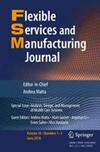绿色排序和路由问题的数学方法
IF 3.2
3区 工程技术
Q2 ENGINEERING, INDUSTRIAL
引用次数: 0
摘要
摘要:本文解决了绿色排序和路径问题,其中包括确定仓库内存储和/或检索操作的最佳位置顺序,使用由电动汽车(例如配备锂离子电池的汽车)和传统汽车(例如配备内燃机的汽车)组成的车队。对该问题提出了一个混合整数线性规划公式,并在对该数学公式进行适当分解的基础上提出了两种数学方法。这两种数学方法已经在一组中小型实例上进行了测试,并将它们的性能与第三种数学方法进行了比较,第三种数学方法以前只针对传统车辆提出,现在适合扩展到处理绿色方面的问题。执行的分析使人们能够根据一些标准计算指标(即计算时间和百分比最优性差距)以及与参考公司商定的解决方案的一些定性方面确定最有前途的数学方法。这样一个最有前途的算法随后被进一步测试,以收集一些技术见解,了解问题难以解决的原因,并概述一些管理见解。此外,它的性能已经在一个真实实例池中进行了测试,这些实例包括普通的日子(要执行的操作数量通常)和非常繁忙的日子,在考虑的真实应用程序上下文中也显示了它的功效和效率。本文章由计算机程序翻译,如有差异,请以英文原文为准。
Matheuristic approaches to the green sequencing and routing problem
Abstract The paper addresses the green sequencing and routing problem, which consists in determining the best sequence of locations to visit within a warehouse for storing and/or retrieval operations, using a fleet composed of both electric vehicles, e.g., equipped with a lithium-ion battery, and conventional vehicles, i.e., with an internal combustion engine. We present a Mixed-Integer Linear Programming formulation to the problem and propose two matheuristics based on suitable decompositions of the mathematical formulation. The two matheuristics have been tested on a pool of small-medium size instances and their performance has been compared to the one of a third matheuristic, previously proposed for the case of conventional vehicles only and here suitable extended to deal with the green aspects of the problem. The performed analysis allowed one to identify the most promising matheuristic in terms of some standard computational indicators, i.e., computing time and percentage optimality gap, as well as in terms of some qualitative aspects of the solutions agreed with a reference company. Such a most promising algorithm has then been further tested to gather some technical insights on what makes the problem hard to solve, as well as to outline some managerial insights. Moreover, its performance has been tested on a pool of real instances comprising ordinary days (with a usual amount of operations to perform) and extremely busy days, showing its efficacy and efficiency also in the considered real application context.
求助全文
通过发布文献求助,成功后即可免费获取论文全文。
去求助
来源期刊

Flexible Services and Manufacturing Journal
ENGINEERING, MANUFACTURING-OPERATIONS RESEARCH & MANAGEMENT SCIENCE
CiteScore
5.60
自引率
7.40%
发文量
41
审稿时长
>12 weeks
期刊介绍:
The mission of the Flexible Services and Manufacturing Journal, formerly known as the International Journal of Flexible Manufacturing Systems, is to publish original, high-quality research papers in the field of services and manufacturing management. All aspects in this field including the interface between engineering and management, the design and analysis of service and manufacturing systems as well as operational planning and decision support are covered. The journal seeks papers that have a clear focus on the applicability in the real business world including all kinds of services and manufacturing industries, e.g. in logistics, transportation, health care, manufacturing-based services, production planning and control, and supply chain management. Flexibility should be understood in its widest sense as a system’s ability to respond to changes in the environment through improved decision making and business development procedures and enabling IT solutions.
 求助内容:
求助内容: 应助结果提醒方式:
应助结果提醒方式:


